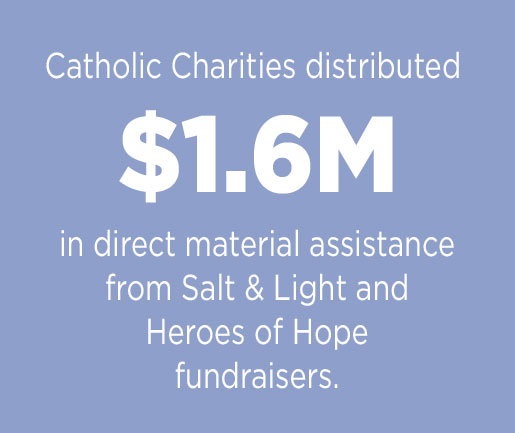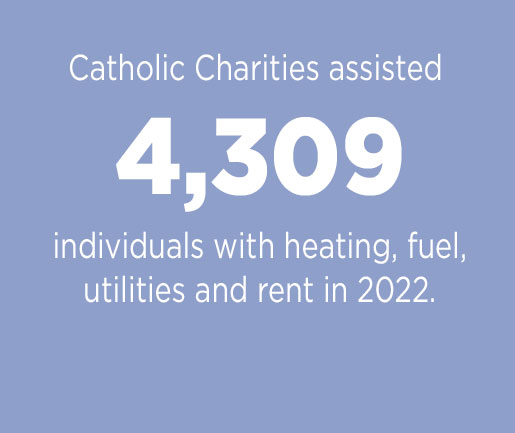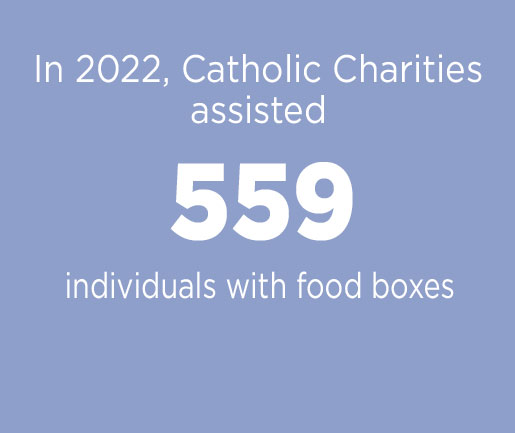Notice of Privacy Practices
THIS NOTICE DESCRIBES HOW MEDICAL INFORMATION ABOUT YOU MAY BE USED AND DISCLOSED AND HOW YOU CAN GET ACCESS TO THIS INFORMATION. PLEASE REVIEW IT CAREFULLY.
This Notice of Privacy Practices is available on the website of Catholic Charities of the Diocese of Greensburg. The web address is www.ccharitiesgreensburg.org.
Website Privacy Policy
All information collected on this site will be kept strictly confidential and will not be sold, rented, traded, loaned or otherwise disclosed. Catholic Charities does not sell, share, or otherwise disclose any personally identifiable information, including your name, address or email address to any third parties. Only Catholic Charities or authorized agents have access to personally identifiable information provided by visitors to our site.
Medical Information Privacy Policy
Understanding Your Case Record and Protected Information
Each time you visit Catholic Charities of the Diocese of Greensburg (“Catholic Charities”), or have certain other types of contact with staff of Catholic Charities such as phone calls or home visits, a record of your contact is made. Usually this record contains protected health information (or “PHI”) about the nature of the contact, services provided, treatment goals, results of assessment, progress notes, frequency of contacts, and other information.
Your Health Information Rights
Although your case record is the physical property of Catholic Charities, the protected health information belongs to you. Because the information is about you, you have the right:
- To request a restriction on certain uses and disclosures of your information
- To choose how we contact you
- To choose someone to act for you
- To ask us to limit the information we share
- To inspect and copy your protected health information
- To request amendment of your protected health information
- To find out what disclosures have been made
- Get a list of those with whom we’ve shared your information
- To receive this notice
- To file a complaint if you believe your privacy rights have been violated
Our Duty to Safeguard Your Protected Health Information
We are required to extend certain protections to your protected health information. Except in specific circumstances, we must use or disclose only the minimum necessary protected health information to accomplish the purpose of the use or disclosure.
We reserve the right to change our privacy practices and the terms of this Notice at any time.
We will not use or disclose your protected health information without your authorization, except as described in this notice.
How We May Use and Disclose Your Protected Health information
- Uses and Disclosures Relating to Treatment, Payment, or Health Care Operations.
- Uses and Disclosures Requiring Authorization
For uses and disclosures beyond treatment, payment, and operations purposes we are required to have your written authorization. Authorizations can be revoked at any time to stop future disclosures except to the extent that we have already undertaken an action in reliance upon your authorization. Your authorization is required regardless of whether our communication with the third party is via verbal, written, or electronic means. - Uses and Disclosures Requiring Neither Consent Nor Authorization
The law provides that we may use and/or disclose your protected health information without consent or authorization in certain circumstances such as to report suspicions of child abuse or to comply with a court order, etc. - Uses and Disclosures Requiring That You Have the Opportunity to Object
- To families, friends, or others involved in your care
- For fundraising purposes.
You have some choices in the way that we use and share information as we:
- Tell family and friends about your condition
- Provide disaster relief
- Include you in a hospital directory
- Provide mental health care
- Market our services and sell your information
- Raise funds
- If you are not able to tell us your preference, for example if you are unconscious, we may go ahead and share your information if we believe it is in your best interest. We may also share your information when needed to lessen a serious and imminent threat to health or safety
We are allowed or required to share your information in other ways – usually in ways that contribute to the public good, such as public health and research. We have to meet many conditions in the law before we can share your information for these purposes. For more information see: www.hhs.gov/ocr/privacy/hipaa/understanding/consumers/index.html. Help with public health and safety issues.
We can share health information about you for certain situations such as:
- Preventing disease
- Helping with product recalls
- Reporting adverse reactions to medications
- Reporting suspected abuse, neglect, or domestic violence
- Preventing or reducing a serious threat to anyone’s health or safety
- Do research
We can use or share your information for health research or to comply with the law
- We will share information about you if state or federal laws require it, including with the Department of Health and Human Services if it wants to see that we’re complying with federal privacy law.
Respond to organ and tissue donation requests
- We can share health information about you with organ procurement organizations.
Work with a medical examiner or funeral director
- We can share health information with a coroner, medical examiner, or funeral director when an individual dies.
We can use or share health information about you:
- For workers’ compensation claims
- For law enforcement purposes or with a law enforcement official
- With health oversight agencies for activities authorized by law
- For special government functions such as military, national security, and presidential protective services
We can share health information about you in response to a court or administrative order, or in response to a subpoena.
For More Information or to Report a Problem
- If you have questions and would like more information, you may contact the Chief Privacy Officer at Catholic Charities’ main office in Greensburg. The phone number is 724-837-1840. If you believe your privacy rights have been violated, you can file a complaint with the Chief Privacy Officer or with the Secretary of the Department of Health and Human Services by sending a letter to 200 Independence Avenue, S.W., Washington, D.C. 20201, calling 1-877-696-6775, or visiting www.hhs.gov/ocr/privacy/hipaa/complaints/
There will be no retaliation for filing a complaint.
Effective Date of this Notice is March 7, 2014.





